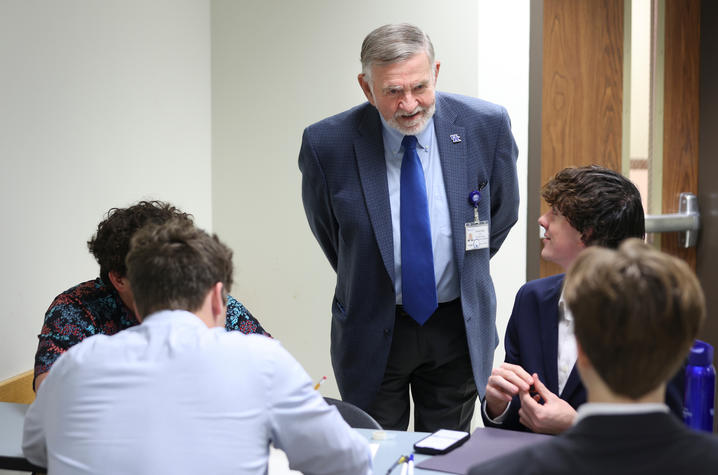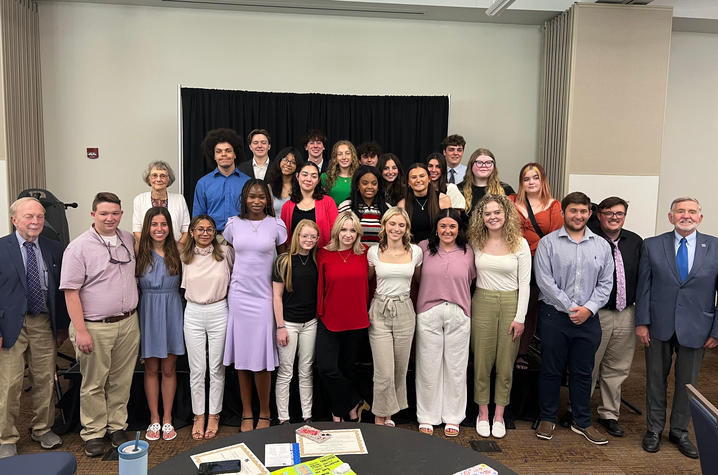UK program expands to offer rural Kentucky students more opportunities in medicine
LEXINGTON, Ky. (June 17, 2024) — For years, the University of Kentucky College of Medicine’s Professional Education Preparation Program (PEPP)-Scholars has provided summer academic enrichment activities to rising college freshmen from racially/ethnically underrepresented or rural backgrounds. The goal of this early exposure to the field of medicine carries with it the hope of solidifying their commitment to the career path. PEPP-Scholars creates opportunities for participants to learn, grow and network.
This year, thanks to the generosity of the non-profit Fort Logan Derby-Wright Foundation, PEPP-Scholars was expanded to include seven students from rural Kentucky counties.
Rural Kentucky faces a shortage of health care workers. A lack of local providers means significantly increased wait times to see a physician, in addition to greater cost and travel time for those seeking comprehensive medical care at a referral center. Many patients just postpone necessary preventative treatment.
The partnership is helping bridge that care gap with a simple idea: Local medical students from rural counties are more likely to return home to fill health care gaps in their own communities.
“In my personal experience, that’s true,” said Michael Rankin, M.D., a decorated UK medicine alum who grew up on a Lincoln County farm. “Our alumni data certainly supports this. If you’re from a rural area, went to high school in rural Kentucky, did your undergraduate work at UK then medical school and residency at UK, chances are greater than 70% you’re still in Kentucky.”
The one-week, residential education program gives students who are interested in medicine a taste of college and an opportunity to learn from UK HealthCare experts.
“The University of Kentucky College of Medicine is intentional in its efforts of fulfilling the mission of creating a diverse and inclusive environment that promotes excellence in education, equitable health care and transformative research to improve the health and wellness of Kentucky and beyond,” said Wendy Jackson, M.D., associate dean for admissions. “Our pathway programs are just one approach to the overarching plan to improve access to health care across the Commonwealth of Kentucky. These talented program participants are part of the solution for a healthier Kentucky.”
The Fort Logan Derby-Wright Foundation helped PEPP-Scholars expand to include seven students from high schools in Boyle, Lincoln and Garrard counties. The foundation aims to support health care in Lincoln and surrounding counties.
“I feel fortunate to be able to give back to make it easier for some of our students coming in my footsteps years later,” said Rankin, who is a member of the foundation’s board of directors. “Back in my day, we didn’t have the scholarships, we didn’t have the ability to shadow or the mentors to show what medicine was all about. Hopefully, we can provide that opportunity through the PEPP program.”
From June 2-7, students stayed on campus in dorms and took in lectures and hands-on learning opportunities centered on diabetes and the disease’s effects on Kentuckians. They also heard from alumni from rural backgrounds like Rankin and Samuel Matheny, M.D., another UK College of Medicine alum from Lincoln County and Fort Logan Derby-Wright Foundation board member.
For Henry Hurley, a Gatton Academy graduate from Danville who will be attending UK in the fall, the week was not only an opportunity to check out his future Lewis Hall dorm but also to gain greater perspective on the medical field he’s determined to pursue.
“This week is a great combination of smaller scale science stuff combined with an overview of the path we’re taking,” Hurley said. “Hearing from doctors about their experiences and being in the medical school for the first time, it’s just been a great experience.”
Students toured the cadaver lab and gave final presentations on what they’d learned for the week. They networked with not just doctors but also with nursing, public health and pharmaceutical professionals to show that providing excellent health care is a team effort.
“Physicians need to know who their team is,” said Jim Ballard, Ed.D., the director of the Center for Interprofessional and Community Health Education. “These folks, once they become physicians, they’re going to know what a nurse does, what public health does in their communities, what a physician assistant can do. It’s a much more holistic experience.”
Coming from a small high school to a large university can be intimidating, so the program also helps students adjust to college life during a summer session when campus is less populated.
Garrard County High School graduate Alondra Sorcia said she and her sister are among the first in their family to pursue degrees in higher education. She aims to attend Bluegrass Community and Technical College with plans to become a dental hygienist. Getting to experience a college campus with other students the same age and with similar backgrounds is exciting, she said.
“I just met them Sunday and I feel like I’ve known them for 10 years,” Sorcia said of her peers in the program. “This is a great opportunity to meet new people and see what everyone else’s dreams are as well.”
The program met both the expectations of the medical community and the students’ interests — which included fun activities like a fitness class and using their collective critical thinking skills to solve a breakout room, Sorcia said.
The College of Medicine offers other professional pipeline programs like PEPP MD — which offers rising college sophomores from underrepresented and rural communities specialized exposure to various health care professions. The UKMED program gives rising college juniors an in-depth look at what medical school is like through interactions with faculty and students.
The new Michael D. Rankin MD Health Education Building, slated to open in 2026, will give the university the opportunity to train more of the state’s much needed health care professionals.
“We have seven counties with no physicians and six more counties with only one physician,” Rankin said. “We desperately need more physicians.”
The future home of the Center for Interprofessional and Community Health Education and the colleges of Medicine, Nursing, Public Health and Health Sciences, the building will enable the university to train hundreds more nurses, doctors, clinicians and other health professionals.
As the state’s flagship, land-grant institution, the University of Kentucky exists to advance the Commonwealth. We do that by preparing the next generation of leaders — placing students at the heart of everything we do — and transforming the lives of Kentuckians through education, research and creative work, service and health care. We pride ourselves on being a catalyst for breakthroughs and a force for healing, a place where ingenuity unfolds. It's all made possible by our people — visionaries, disruptors and pioneers — who make up 200 academic programs, a $476.5 million research and development enterprise and a world-class medical center, all on one campus.







